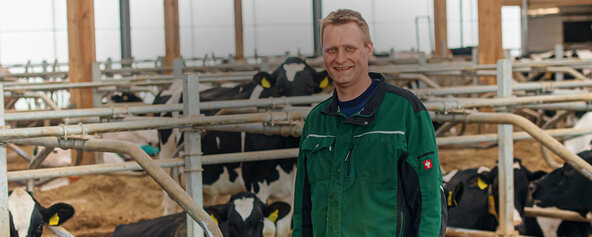
Simple processes
In the meantime, however, a certain routine has been established: He knows exactly the production costs of the farm, which has around 530 cows, reads the trade press, observes the Kiel exchange milk value and checks this again on the morning of a trading day before weighing up for himself whether the prices offered on Fixed Price are attractive for his farm. He does not focus directly on achieving maximum prices, but rather on planning security and balancing out the difference between peaks and troughs in the milk price, which a fixed price offers him in times of extremely fluctuating markets. His father also makes these considerations at the same time and so the two of them consult during their lunch break, contact their management consultant in individual cases, then make a decision and submit an offer online during the course of the day. “It's great that it's possible to submit bids until 10 p.m., so we're absolutely flexible,” he says. “As the platform is simple and easy to understand for everyone, this part takes very little time overall.”

More planning security
This way, he can quickly put the topic out of his mind and concentrate on other tasks. Because as important as it is for Söhnke Schlichtmann to deal with the topic of the dairy market and think about his income, the daily work on the farm must not be neglected. And that's exactly what makes Fixed Price attractive to him: “I deal with it intensively twice a month, whereas if I were to trade completely independently on the stock exchange, I would have to constantly follow the prices. That would be too nerve-wracking.” With Fixed Price, he has to wait and see how much of the offered quantity is actually hedged, but he knows that the price is fixed and that he will find this exact price on his milk money statement for the month in question. Without any other costs or deductions.
Independent action
The fixed price offered on Fixed Price replaces the DMK basic price and is paid for the quantity of milk actually delivered in the agreed delivery month. This means that all farm-specific price corrections, surcharges and discounts, for example fat and protein corrections, must be added to the fixed price. DMK includes all other system costs, including those arising from hedging transactions, as well as financing costs and basis risk, in the fixed price offer. This means that milk producers do not bear any additional costs without hedging. He recommends that his colleagues deal with the topic of hedging: “You really don't need to be afraid of it. You can approach it carefully and then decide for yourself whether you want to offer volumes. It's not a guarantee of high prices, but it is a tool for hedging.”
Balancing out fluctuations
Participation also makes sense in terms of investments: “The bankers see it as positive that you are dealing with the issue and can show a security with which you can pay the running costs of the business as well as repayments. That is a certain security that we milk producers will also need in the future.” Twenty years ago, says the farmer, milk prices were constant, but today they are very volatile. “Fixed price helps us to balance out precisely these fluctuations.”
